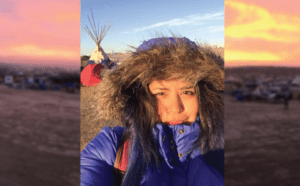The radical act of Black self-care
I have always been a revolutionary in the works. That is to say that I have always been deeply aware of the injustices inherited by my existence as a Black woman. I have always known that I was not truly free as the Black stepchild of a resentful America. I have always known that my rich, ebony skin, kissed by both God and the sun just a little longer than others, caused the world to navigate my humanity differently, viciously. Yet, I have always known deep in my depths that these caveats to Blackness were wrong, undeserved and in need of systemic change. As such, I have always been radicalized.

Over the years, my radicalization became more refined. I transitioned out of fussing with my high school teachers for teaching a limited scope of Black history only in February to having a more expansive view of radicalization and radical action. And in my 20s, I spent a tremendous amount of time focusing on radical action. I became a fervent community activist involved in every opportunity that was presented to me. I advocated for the end of cash bail and visited those imprisoned simply because they weren’t in a socio-economic position to pay for their freedom. I hosted festivals that raised money to bail out incarcerated children. I led workshops on how to approach anti-racism on a day-to-day basis. I marched. I preached. I did all the things until I felt there were no more things to do. Or rather, I did all the things until I had no energy to do anything well.
I burned out. Suddenly my passionate fight for justice began conjuring up feelings of resentment and irritation, towards both my colleagues and those directly impacted by injustice. My once empathetic and energized attitude was slowly chiseled away by fatigue, cynicism and a touch of anger. I was puzzled by these sudden feelings and began searching for their roots. How could I suddenly feel so differently about good work? After some searching, I concluded that I had not been honoring the holy tradition of Sabbath. I was working every day, without making time for any intentional rest, and was thus pouring from an empty cup. I had not a drop of energy and passion remaining in my chalice. I needed to rest. I needed to seek sabbath.
Remember the Sabbath day, to keep it holy. Six days you shall labor, and do all your work, but the seventh day is a Sabbath to the LORD your God. On it you shall not do any work, you, or your son, or your daughter, your male servant, or your female servant, or your livestock, or the sojourner who is within your gates. For in six days the LORD made heaven and earth, the sea, and all that is in them, and rested on the seventh day. Therefore the LORD blessed the Sabbath day and made it holy. (Exodus 20: 8-11)
So early in our ancient holy text is the need for rest emphasized. Rest was structurally ingrained into ancient Hebrew society and its culture. Daily habits and practices throughout the week ensured that rest could take place on the seventh day … or violators would be punished, possibly by death. That is the extent to which rest was honored in their culture.
In our capitalist American experience, valuing rest above productivity is viewed as unpatriotic. The farce that is the American Dream, theoretically within reach if one is willing to work hard enough, centers labor and values it above all else. It is the ability to labor and produce that defines your American-ness, your humanity. As such, the more willing a participant is to labor and produce, the more they are valued as a person. They are even lauded as American “heroes.” This focus on labor and production intensifies in the Black American experience. Since America’s introduction to the Black body, we have been considered a product whose existence is to labor only. There is no rest for the weary, oppressed Black soul in a society that only recognizes the value of that soul’s ability to “do.”
Today, I reject that existence. I am a person. I am whole. I am precious. And in order to preserve my wholeness and preciousness, I need to be intentional about resting. Rest subverts the filthy messages of American capitalism that assert my value is based exclusively on what I produce. I am more than a laborer. God calls us to challenge the norms of our society by seeking the restoration that results from sabbath rest. This restoration is especially important for people of color and faith who experience the daily labor of living in a deeply racist society. Intentional rest affords us the space and opportunity to slow down and be met by God. Constant labor and production absorb the space meant for God and child to plunge deeper in relationship. Intentionally slowing down to meet the needs of oneself makes space for God to get in and meet our needs as well. Rest as a spiritual discipline is a revolutionary decision that I think the Black body should dare to believe it deserves.
So, as of January 1, 2021, I decided to intentionally rest. I stepped down from church leadership. I’ve slowed down my community organizing, focusing on a single purposeful group instead of four. I am taking the time to have the faith and courage to expect God to meet me in rest. I know He will restore my soul. Once I bask in the sweet beauty of God’s revolutionary rest, and when my sabbath ends, I will once again pour from the fullness of Him.
Until then, I’m gon’ nap!
B ethany Stewart is an HBCU graduate living in what she describes as the perfect city, Philadelphia, PA. She works as an Education and Employment Specialist for formerly homeless young adults while also working as a community organizer focused on ending mass incarceration. She enjoys the beauty of God’s creation in nature and has been known to set it off if one begins making up “house rules” during a game of Uno.
ethany Stewart is an HBCU graduate living in what she describes as the perfect city, Philadelphia, PA. She works as an Education and Employment Specialist for formerly homeless young adults while also working as a community organizer focused on ending mass incarceration. She enjoys the beauty of God’s creation in nature and has been known to set it off if one begins making up “house rules” during a game of Uno.


